Unit+3终极导学案
必修三unit3导学案资料

必修三u n i t 3 导学案课型一:阅读课(warming up, pre-reading, reading andcomprehe nding)课型二:词汇课(Discovering useful words and phrases)课型三:语法课(Discovering useful structure)课型四;语言技能课(Usi ng Ian guage)课型五:写作课(Reading and writing)课型六:测试课课型一:阅读课教学内容Warming up; Pre-reading; Reading;Comprehe nding教学目标1•了解戏剧体裁的特点,学习和理解戏剧语言,尝试表演戏剧,提高文学修养和欣赏水平。
2•学习《百万英镑》的故事,了解马克吐温的生平和他的作品风格,探讨金钱和人性的关系,树立正确的价值观和人生观。
词汇:birthplace; no vel; adve nture; phrase; author; sce ne;wander; pavement; permit; ahead; stare; fault; spot; passage acco unt; seek; con trary; un believable; amount; rude; manner scream; genuine; issue; fake; bow;短语:bring up; make a bet; go ahead; by accident; stare at; acco unt for; on the con trary; take a cha nee; in rags; as for. 自主学习&合作探究自主学习1•阅读该部分内容,了解马克吐温及其作品。
2.让学生交流他们所读过的马克吐温的其他作品。
合作探究Pre-read ing讨论Pre-reading中的问题,在书上给出答案。
人教版八年级英语(上册)Unit3导学案设计
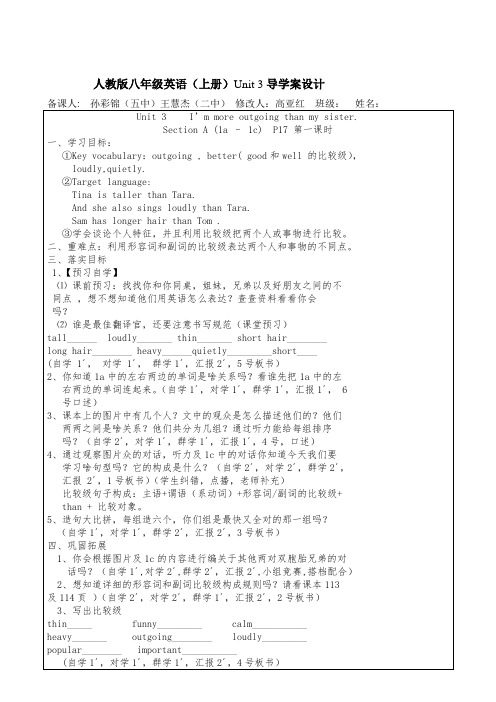
【训练案】
1、根据汉语提示完成单词。
① This is a ________(精彩的)movie .
2、想知道详细的形容词和副词比较级构成规则吗?请看课本113
及114页 )(自学2´,对学2´,群学1´,汇报2´,2号板书)
3、写出比较级
thin_____ funny_________ calm___________
heavy_______ outgoing________ loudly_________
比较级句子构成:主语+谓语(系动词)+形容词/副词的比较级+
than + 比较对象。
5、造句大比拼,每组造六个,你们组是最快又全对的那一组吗?
(自学1´,对学1´,群学2´,汇报2´,3号板书)
四、巩固拓展
1、你会根据图片及1c的内容进行编关于其他两对双胞胎兄弟的对
话吗?(自学1´,对学2´,群学2´,汇报2´,小组竞赛,搭档配合)
备课人:孙彩锦(五中)王慧杰(二中)修改人:高亚红班级:姓名:
Unit 3I’m more outgoing than my sister.
Section A (1a–1c) P18 第二课时
一、学习目标:
知识目标
①Key vocabulary:hard-working , competition ,fantastic ,
which , clearly ,win ,though .
②Target language:
I think Lisa sang better than Nelly.
人教版八年级上册英语 Unit 3 导学案 (优质)
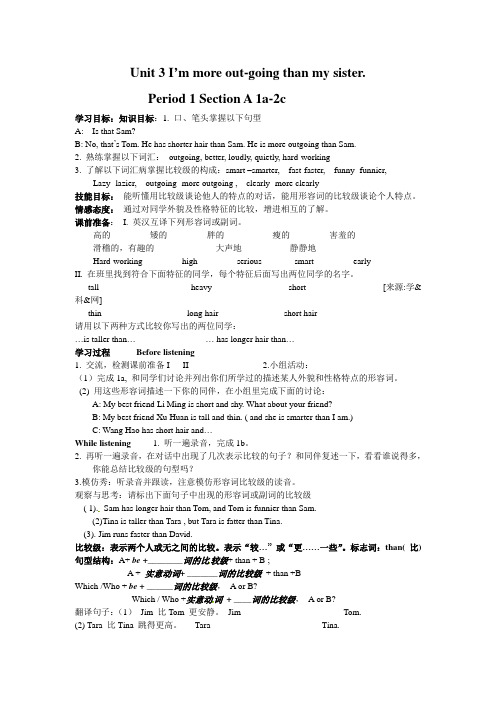
Unit 3 I’m more out-going than my sister.Period 1 Section A 1a-2c学习目标:知识目标:1. 口、笔头掌握以下句型A: Is that Sam?B: No, that’s Tom. He has shorter hair than Sam. He is more outgoing than Sam.2. 熟练掌握以下词汇:outgoing, better, loudly, quietly, hard-working3. 了解以下词汇病掌握比较级的构成:smart –smarter, fast-faster, funny- funnier,Lazy- lazier, outgoing- more outgoing , clearly- more clearly技能目标:能听懂用比较级谈论他人的特点的对话,能用形容词的比较级谈论个人特点。
情感态度:通过对同学外貌及性格特征的比较,增进相互的了解。
课前准备:I. 英汉互译下列形容词或副词。
高的_______ 矮的_______ 胖的________ 瘦的_______ 害羞的_____________ 滑稽的,有趣的___________ 大声地_________ 静静地____________Hard-working_______ high ________ serious_______ smart_______ early________- II. 在班里找到符合下面特征的同学,每个特征后面写出两位同学的名字。
tall_____ ________ heavy ______ ________ short _______ _________[来源:学&科&网]thin _______________long hair ______ ______ short hair _______ __________请用以下两种方式比较你写出的两位同学:…is taller than…… has longer hair than…学习过程Before listening1. 交流,检测课前准备I II2.小组活动:(1)完成1a, 和同学们讨论并列出你们所学过的描述某人外貌和性格特点的形容词。
UNIT3复习导学案人教版九年级英语全册
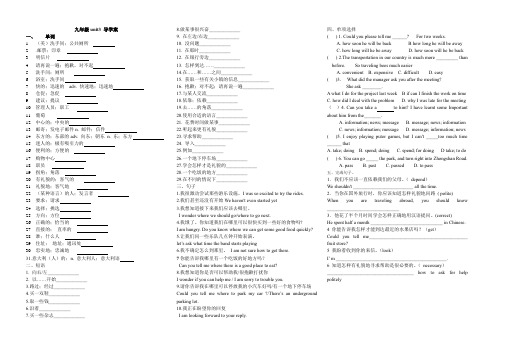
九年级unit3 导学案一、单词1.(美)洗手间;公共厕所2..邮票;印章3.明信片4.请再说一遍;抱歉,对不起5.洗手间;厕所6.浴室;洗手间7.快的;迅速的adv. 快速地;迅速地8.仓促;急促9.建议;提议10.管理人员;职工11.葡萄12.中心的;中央的13.邮寄;发电子邮件n. 邮件;信件14.东方的;东部的adv. 向东;朝东n. 东;东方15.迷人的;极有吸引力的16.便利的;方便的17.购物中心18.职员19.拐角;角落20.有礼貌的;客气的21.礼貌地;客气地22.(某种语言)的人;发言者23.要求;请求24.选择;挑选25.方向;方位26.正确的;恰当的27.直接的;直率的28.谁;什么人29.住址;地址;通讯处30.忠实地;忠诚地31.意大利(人)的;n. 意大利人;意大利语二、短语1. 向右/左_____________2. 以……开始_____________3.路过;经过_____________4.买一双鞋_____________5.取一些钱_____________6.沿着_____________7.买一些杂志_____________8.做某事很兴奋_____________9. 在左边/右边_____________10. 没问题_____________11. 在那时_____________12. 在银行旁边_____________13. 怎样到达……_____________14.在……和……之间_____________15. 获取一些有关小镇的信息_____________16. 抱歉;对不起;请再说一遍_____________17.与某人交流_____________18.依靠;依赖_____________19.去……的角落_____________20.使用合适的语言_____________21. 花费时间做某事_____________22.听起来更有礼貌_____________23.寻求帮助_____________24. 导入_____________25.例如_____________26.一个地下停车场_____________27.学会怎样才是礼貌的_____________28.一个吃饭的地方_____________29.在不同的情况下_____________三、句子1.我很激动尝试那些游乐设施。
新人教版七年级英语下册《Unit 3》导学案
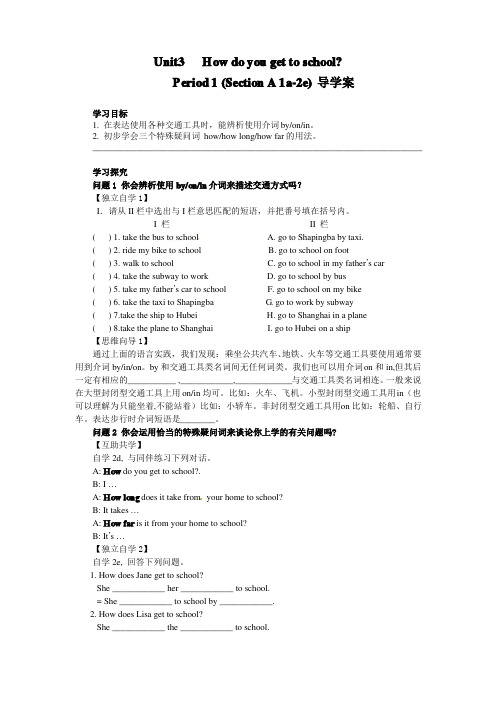
Unit3How do you get to school?Period 1 (Section A 1a-2e)导学案学习目标1.在表达使用各种交通工具时,能辨析使用介词by/on/in。
2.初步学会三个特殊疑问词how/how long/how far的用法。
___________________________________________________________________________学习探究问题1你会辨析使用by/on/in介词来描述交通方式吗?【独立自学1】I.请从II栏中选出与I栏意思匹配的短语,并把番号填在括号内。
I栏II栏() 1. take the bus to school A. go to Shapingba by taxi.() 2. ride my bike to school B. go to school on foot() 3. walk to school C. go to school in my father’s car() 4. take the subway to work D. go to school by bus() 5. take my father’s car to school F. go to school on my bike() 6. take the taxi to Shapingba G. go to work by subway() 7.take the ship to Hubei H. go to Shanghai in a plane() 8.take the plane to Shanghai I. go to Hubei on a ship【思维向导1】通过上面的语言实践,我们发现:乘坐公共汽车、地铁、火车等交通工具要使用通常要用到介词by/in/on。
by和交通工具类名词间无任何词类。
我们也可以用介词on和in,但其后一定有相应的___________ ,____________,_____________与交通工具类名词相连。
Unit 3导学案2021--2022学年人教版七年级英语下册

Unit 3 How do you get to school?( Period 1 Section A 1a—2d )【学习目标】A级目标(词汇):train, bus, subway, ride, bike...B级目标(短语):take the train, take the bus, take the subway, ride a bike..C级目标(句型):谈论如何到达某地【自学指导】A任务:1.请同学们尽可能多的说出表示交通工具的词汇2.自主完成1a,将单词与图片匹配B任务:小小翻译官1.到校________________2.坐火车___________________3.坐公汽_______________4.乘地铁___________________5.骑单车________________6.步行_____________________C任务:和你的同桌练习下面的对话,斜体部分可以互换eg. ---How do you get to school? ---I ride my bike / take the bus … to school.【当堂检测】A检测:根据中文写单词或者短语1.火车________2.公共汽车________3.地铁_____________4.乘地铁_________ ___________5.骑________6.自行车________ ________7.骑自行车(动作)________________8.六十________9.七十________10. 一百________ ______11.分钟_____________12.千米,公里________________ 13.新的_______ 14.乘(交通工具)____________ 15.骑自行车(方式)_______________ B检测:试翻译词组,熟读并记住它们的意思1. take the train ___________2. take the subway___________3. ride a horse _________4. by train ___________5. by subway _______________6. by horse _____________ C检测:小小翻译官1.你怎样到达学校?骑自行车?2.去学校要花多少时间?大约40分钟。
牛津译林版七年级英语下册《Unit 3》导学案1

专注:心无旁骛,万事可破《Unit 3》导学案目标导航1、掌握以下单词和词组:mine nothing tin pizza onlywa it a minute 稍等exchange student 交换生take to...带某人去...2、通过卡通漫画中Eddie 和Hob o之间的有趣的对话,了解本单元的学习重点。
课堂反馈练习一、根据句意和中文提示完成句子1.how many (听) of dog food are there in Eddie’s fridge?2. (没有) of the answers are right.3. (欢迎) to our town for a trip.4.my favourite sport is (足球).5.we can buy (只有) one pizza (用) the (钱).6.I can’t find my Walkman. (也许) it’s in my brother’s bedroom.7.There isn’t enough fo od in the fridge .Let’s go to the (大型购物中心) to buy some.8.What dishe s do you want to (点).二、用所给词的正确形式填空。
1.Jim is a movie fan.He (love) (watch) films.2.Simon enjoys (play) tennis.3.He likes (eat) .He often goes to lots of different Ch ine se (restaurant).4.She often takes her daughter (climb) hills in winter.5.Would you like (go) to the sports center with me?1 / 1。
人教版九年级英语上册Unit3导学案
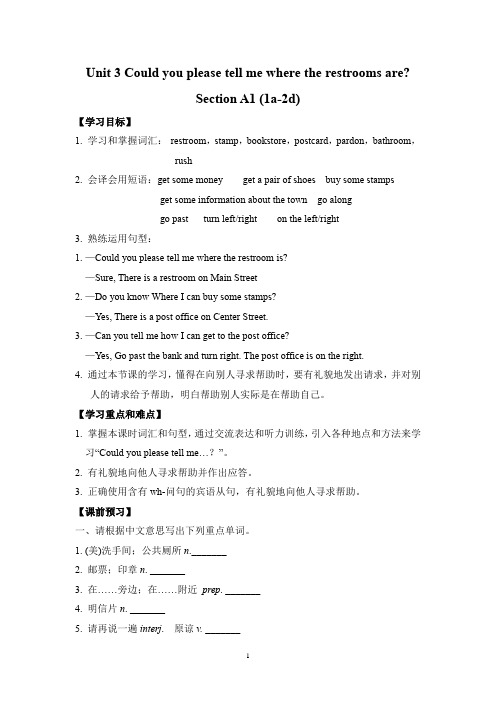
Unit 3 Could you please tell me where the restrooms are?Section A1 (1a-2d)【学习目标】1. 学习和掌握词汇:restroom,stamp,bookstore,postcard,pardon,bathroom,rush2. 会译会用短语:get some money get a pair of shoes buy some stampsget some information about the town go alonggo past turn left/right on the left/right3. 熟练运用句型:1.—Could you please tell me where the restroom is?—Sure, There is a restroom on Main Street2.—Do you know Where I can buy some stamps?—Yes, There is a post office on Center Street.3.—Can you tell me how I can get to the post office?—Yes, Go past the bank and turn right. The post office is on the right.4. 通过本节课的学习,懂得在向别人寻求帮助时,要有礼貌地发出请求,并对别人的请求给予帮助,明白帮助别人实际是在帮助自己。
【学习重点和难点】1. 掌握本课时词汇和句型,通过交流表达和听力训练,引入各种地点和方法来学习“Could you please tell me…?”。
2. 有礼貌地向他人寻求帮助并作出应答。
3. 正确使用含有wh-问句的宾语从句,有礼貌地向他人寻求帮助。
【课前预习】一、请根据中文意思写出下列重点单词。
2024人教新目标八年级下册英语Unit 3Section A ( 1a- 2d) 导学案

Unit 3 Could you please clean your room?Section A ( 1a- 2d) 导学案学习目标:1.熟读本课单词: rubbish, fold, sweep-swept, floor, mess2. 词汇:do the dishes, take out the rubbish, fold the clothes, sweep the floor, make the bed,clean the living room, no problem, come over, clean up the kitchen, go out for dinner, go to the movies, stay out late, get a ride, work on, have to do, need to do, get something to drink, help out with, at least, finish doing,be enough for you, be back from shopping3. 句型:Could you please sweep the floor? Yes, sure.Could I watch TV? Yes, you can.Could you please help out with a few things?I think two hours of TV is enough for you.She won’t be happy if she sees this mess.课前预习:一、请在书本17,18和98, 99页划出学习目标里的词组以及句型。
三、单项选择。
1. For kids of this age, two hours of sitting in a classroom ______ too long.A. isB.areC. wasD.were2. He used to return home ______ once a year, but hasn't been back for almost three years now because of the hard job in a crayon factory.A. at leastB. at lastC. at mostD. at first3. —Could you take out the rubbish and do the dishes, Tony?—Sure. Mom will be mad if she sees this ______, I think.A. matterB. messC. troubleD. difficulty4. —Can you come to my birthday party tonight?—Yes, I'd love to. But I have to finish ______ my English homework first.A. doingB. to doC. doesD. do四、根据汉语意思完成英语句子,每空一词。
Unit 3导学案(含答案)人教版九年级英语全册

UNIT 3 Could You Please Tell Me Where the Restrooms Are?一、重点短语①路过;经过____pass by________①pardon me______对不起;请原谅_______①走过书店_____walk by a bookstore_______①mail a letter______邮寄一封信_______①沿着...走______go walk along_______①on one’ s way to... _____在去...的路上_______①建议做某事____suggest doing_______① lead into a request_____提出一个请求________①做某事很方便______be convenient to do_______①look forward to… ______期盼;盼望_______二、知识点讲解1. both, all, either, neither, none 的区别(1) both ---“都”(两者)(2) all ---“都”(三者及以上)(3) either---①两者中的任何一个;②也(否定)(4) neither---“都不”(两者)(5) none---“都不”(三者及以上)Eg.①___Both____ Lucy and Kate are going to see a film tonight.②I have only one ticket, so ____either___ Lucy or Kate ___is____ (is / are) going to see a film tonight.③___All____ the students in China are going to enjoy their 7-day holiday.④--- Would you like some tea or coffee?---___Neither____. I’d like some water.⑤___None____ of us like summer, because it’s too hot.2. between 和among的区别(1) between .... and... 在...和....之间(两者)(2) among用于三者或三者以上的比较3. spend, take, cost与pay辨析(1) spend,其主语通常是人,结构为:spend time/ money doing sth. “花费时间/金钱做某事” 或spend money on sth.“在某事/某物上花费金钱”(2) take,常用it作形式主语,It takes sb. some time to do sth.“做某事花费某人多长时间”。
八年级上Unit3英语导学案
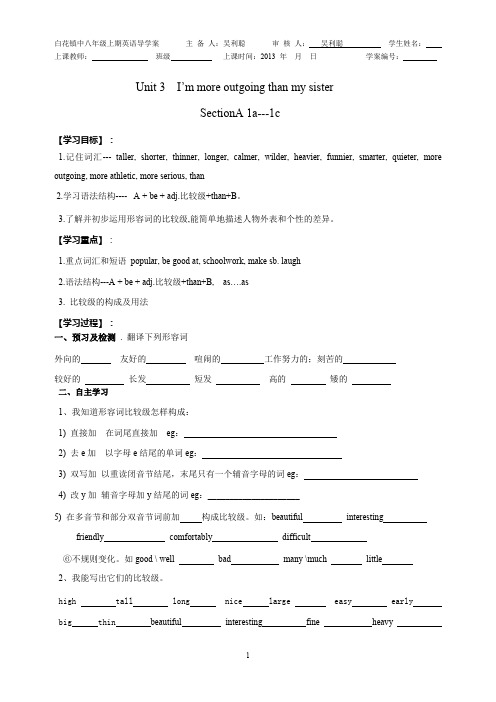
白花镇中八年级上期英语导学案主备人:吴利聪审核人:吴利聪学生姓名:上课教师:班级上课时间:2013 年月日学案编号:Unit 3 I’m more outgoing than my sisterSectionA 1a---1c【学习目标】:1.记住词汇--- taller, shorter, thinner, longer, calmer, wilder, heavier, funnier, smarter, quieter, more outgoing, more athletic, more serious, than2.学习语法结构---- A + be + adj.比较级+than+B。
3.了解并初步运用形容词的比较级,能简单地描述人物外表和个性的差异。
【学习重点】:1.重点词汇和短语popular, be good at, schoolwork, make sb. laugh2.语法结构---A + be + adj.比较级+than+B, as….as3. 比较级的构成及用法【学习过程】:一、预习及检测. 翻译下列形容词外向的友好的喧闹的工作努力的;刻苦的较好的长发短发高的矮的二、自主学习1、我知道形容词比较级怎样构成:1) 直接加在词尾直接加eg:2) 去e加以字母e结尾的单词eg:3) 双写加以重读闭音节结尾,末尾只有一个辅音字母的词eg:4) 改y加辅音字母加y结尾的词eg:_____________________5) 在多音节和部分双音节词前加构成比较级。
如:beautiful interestingfriendly comfortably difficult⑥不规则变化。
如good \ well bad many \much little2、我能写出它们的比较级。
high tall long nice large easy early big thin beautiful interesting fine heavyhot big outgoing funny s hort_______ _ good \ wellbad many \much little old few far三、合作与探究1. 对两人进行外貌、性格的比较,应用:形容词比较级+than。
Unit3导学案人教版七年级英语下册
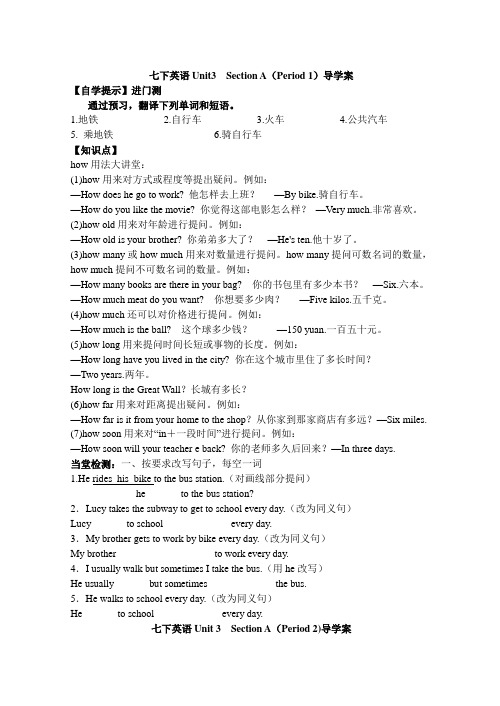
七下英语Unit3 Section A(Period 1)导学案【自学提示】进门测通过预习,翻译下列单词和短语。
1.地铁___________2.自行车_________3.火车_________4.公共汽车_______5. 乘地铁__________________6.骑自行车_______________【知识点】how用法大讲堂:(1)how用来对方式或程度等提出疑问。
例如:—How does he go to work? 他怎样去上班?—By bike.骑自行车。
—How do you like the movie? 你觉得这部电影怎么样?—Very much.非常喜欢。
(2)how old用来对年龄进行提问。
例如:—How old is your brother? 你弟弟多大了?—He's ten.他十岁了。
(3)how many或how much用来对数量进行提问。
how many提问可数名词的数量,how much提问不可数名词的数量。
例如:—How many books are there in your bag? 你的书包里有多少本书?—Six.六本。
—How much meat do you want? 你想要多少肉?—Five kilos.五千克。
(4)how much还可以对价格进行提问。
例如:—How much is the ball? 这个球多少钱?—150 yuan.一百五十元。
(5)how long用来提问时间长短或事物的长度。
例如:—How long have you lived in the city? 你在这个城市里住了多长时间?—Two years.两年。
How long is the Great Wall?长城有多长?(6)how far用来对距离提出疑问。
例如:—How far is it from your home to the shop?从你家到那家商店有多远?—Six miles.(7)how soon用来对“in+一段时间”进行提问。
人教高中必修三Unit3导学案.doc
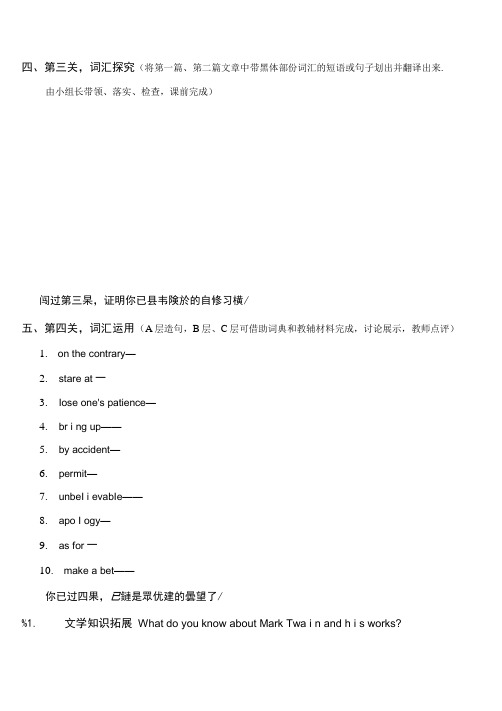
四、第三关,词汇探究(将第一篇、第二篇文章中带黑体部份词汇的短语或句子划出并翻译出来.由小组长带领、落实、检查,课前完成)闯过第三杲,证明你已县韦険於的自修习横/五、第四关,词汇运用(A层造句,B层、C层可借助词典和教辅材料完成,讨论展示,教师点评)1.on the contrary—2.stare at一3.Iose one's patience—4.br i ng up——5.by accident—6.permit—7.unbeI i evabIe——8.apo I ogy—9.as for一10.make a bet——你已过四果,已鏈是眾优建的曇望了/%1.文学知识拓展What do you know about Mark Twa i n and h i s works?Book 3 Unit31. 3. 5. 7. 9. 语 11. 13. 15. 17. ____________ v.鞠躬,弯腰____________ n. 出生地____________ n. 故障;毛病____________ v. 许可;允许____________ n. & v.冒险____________ adv. Certainly; actually____________ vt.发现 n.地点____________ n.方式;习惯 v.凝视;盯着看2. _____________ n.理发店 4. _____________ n.作者;创始人 6. _____________ n.帐目,理由 8. _____________ v.漫步,徘徊 10. ______________ n.短语,习语,惯用12. _____________ n.数量;总额 14. _____________ n.(戏)一场;场面 16. ______________ n.通道;文章18. n. 品The Million Pound Bank Note 导学案(一)——词汇闯关 编制人 王维乖 审核人: 李炜鸣 审批人:吴培峰[Introductio n 】1. Preview the new words and expressions. Memorize 30 key words2. Finish four tasks3. Be active in class activities[Learning aim 】1. Pronounce and spell the new words and expressions correctly2. Try to remember the words and expressions3. Learn to use the bold words and phrases4. Make preparations for the text.一、 优化词汇和词义(由教师提前完成)二、 第一关,拼读单词(由学生课前自学完成,附录音。
- 1、下载文档前请自行甄别文档内容的完整性,平台不提供额外的编辑、内容补充、找答案等附加服务。
- 2、"仅部分预览"的文档,不可在线预览部分如存在完整性等问题,可反馈申请退款(可完整预览的文档不适用该条件!)。
- 3、如文档侵犯您的权益,请联系客服反馈,我们会尽快为您处理(人工客服工作时间:9:00-18:30)。
Unit 3 Could you please tell me where the restrooms are ?Section A 1a-—2d(听说课)编写:赵玉梅审核:赵玉梅挂科领导:___________ 使用者:__________教师寄语:Kill two birds with one stone.一箭双雕。
学习目标:(1)能用宾语从句礼貌的寻求帮助。
(2)能用正确的方法指路。
(3) 培养学生尊重他人,对人有礼貌,热爱生活。
学习过程:Step1、感知(一)了解话题(二)初听材料听力练习:听1b完成课本上的内容(三)发现疑难看1a中的图片,仿1c的内容编对话。
Step2、内化(一)详听材料听录音,完成2a 和2b。
(二)疯狂背诵1、 get some information“获得一些信息”【information\news\message的区别】1)information作“信息”讲,是不可数名词。
例如:They must find out some _______ about planes to Yunnan as quickly as possible.2)news作“新闻”解,它侧重一个“新”字,是不可数名词。
例如:No news _____ good news.没有消息就是好消息。
3)message一般指口头传递的或书写的“消息”,是可数名词。
2、buy a newspaper买报纸【buy sb sth=buy sth for sb】为某人买某物I want to ____a pen_____my mother.=____________________3、Could you please tell me where the restrooms are? 你能告诉我公共厕所在哪吗?Could you please tell me how to get to the bookstore.= Could you please tell me how I can get to the bookstore.1)Could you please (not) do sth … ? “ 你能做/不做……吗?” ;“请你…好吗?”表示有礼貌的请求的交际用语。
could在此不表过去式,而是一种委婉有礼貌的表达,此句中常用some/something表委婉请求或希望得到对方肯定回答,不用any和anything。
Can/Could you tell me______(anything) about your new books?2)此句中where the restrooms are为tell的宾语从句。
【问路时应注意】①问路时应首先说一声:“Excuse me.”这样可以引起对方的注意,又不失礼貌。
②当你没听清时,你可以说一声“Excuse me, would you please say it again?”(对不起,请您再说一遍好吗?) 或“I beg your pardon?”(对不起,请再说一遍好吗?)等,礼貌地要求对方重复一遍。
③问完路后,千万不要忘记向对方说句“Thank you for helping me.”“Thank you.”或“Thanks a lot.”④问路时经常会用到“向左(右)拐”这样的表达,英语对此有两种常见的说法,即turn left (right)或turn to the left (right)。
表示“在左(右)边”,英语用介词on或at均可,on the left/ right。
【用英语问路及其回答】① Excuse me, can you tell me where the railway station is? 打扰一下,请问火车站在哪儿?② Excuse me, but can you tell me the way to the train station? 劳驾,请问去火车站怎么走?③ Excuse me, could you tell me which is the way to the nearest hospital?劳驾,请问去最近的医院怎么走?④ Excuse me, would you please show me the way to the post office? 请告诉我去邮局怎么走好吗?⑤ Excuse me, would you mind telling me the way to the police station?劳驾,请告诉我去警局怎么走好吗?⑥ Excuse me, how can I get to No. 1 Middle School? 劳驾,请问去一中怎么走?⑦ Excuse me, is this the right way to the People’s Park? 打扰了,请问去人民公园走这条路对吗?⑧ Excuse me. Could you tell me if there is a Qiaotou Middle School near here?打扰了,请问桥头中学是否在这附近?⑨ Excuse me. Do you know how I can get to Qiaotou Middle School?= Excuse me. Do you know how to get to Qiaotou Middle School?请问,你知道怎样去桥头中学吗?【指路的方法】① Take along with this street, and … is on you left.② Go down/along this way, and turn left at the first crossing, and you’ll find … is right there, on your left.③… is behind (near, next to, on the left of) …④ You can just take NO.111 bus, and get off at the second station. And you’ll see it.⑤ Look! … is in front of us far away, right there!4、Do you know when the bookstore closes today?你知道今天书店几点关门吗?此句为when引导的宾语从句,宾语从句必须使用_______语序。
eg.Do you know where ______(can ,I) exchange(换)money.5、Go along Main Street until you pass Center Street.就沿着主街走,直到你经过中街。
1)【 until和 till】意为“直到……”,till多用于口语,until可以放在句首,till则不能放在句首。
2) not…until:一般译为“直到……才”表示句子的动作直到until短语所表示的时间才开始发生,即表示动作的起点,遵循“主将从现”的原则。
谓语动词用______________She will go to school until he____(be) 8 years old.3)【pass】动词【past】介词,后跟名词、代词,意为“ 通过”。
go past the bank =____________________ 【复习cross 、across、through、pass、past的区别】(1)【cross, pass】是动词,cross作动词用,有横过、交叉的意思。
Don't cross your legs。
不要交叉双腿。
pass为动词,经过, 穿过, 渡过。
pass by 指走过,路过,pass a post office 经过邮局。
它也有“传递”之意,如:pass a book to me.递给我一本书。
(2)【across, through, over】通常作介词或副词,across是指在平面上或物体表面经过,go across the street “穿过大街”。
across还有对面的意思,在/到……对/面,如across the road。
through“通过, 穿过, 经过, 遍及”,从空间内部穿过的意思,比如隧道、森林、公园、玻璃。
如:go through the forest“穿过森林”。
over“翻越过”侧重于从物体的上方过,高于,超过,the bridge over the river(穿过河上方的桥),she is over forty(她已经超过40岁了)。
across和over两者都表示从一侧向另一侧的运动:但如果越过的是一个高的物体用over(He climbed over the wall. );如果越过的是一个平面,则宜用across。
(3)past也可作名词。
指过去,往事,搭配如in the past(在过去),miss the past (想念过去)crossing名词,“十字路口”6、I’m excited to try the rides!【excited和 exciting的区别】:1)excited意为“激动的;兴奋的”,作表语时,主语通常是人;作定语时,常用来修饰人,说明激动的表情。
be excited to do sth.做某事感到激动。
e.g. All of us were______ when we heard the good news. The ____child opened his present quickly.2) exciting意为“激动人心的”,作表语时,主语通常是物;作定语时,常用来修饰物。
e.g. The movie is very______. My father told me an_______ story.7、Pardon?1) pardon动词,用于语言有障碍的场合,表示对对方的话听不太清楚,向对方提出“再说一遍”做铺垫,意思是“对不起,再说一遍”,回答者只需要重复刚才所说的话即可。
e.g. Pardon? I’m sorry I can’t follow you.8、You don’t need to rush! 你不必着急!rush v. 仓促; 匆忙 n. 仓促; 匆忙9、一般序数词之前要加the eg:_____ second floor, _____ third one(三)归纳总结总结如何向别人委婉表达自己的请求。
Step3、拓展(一)汇报点拨利用2a,2b信息与同伴对话练习完成2c,理解并背诵2d。
